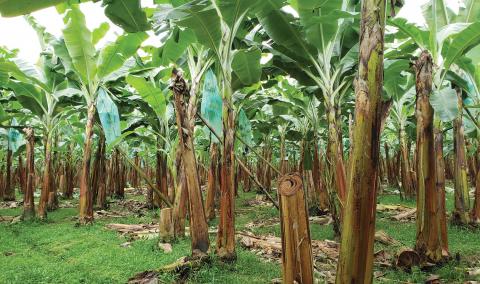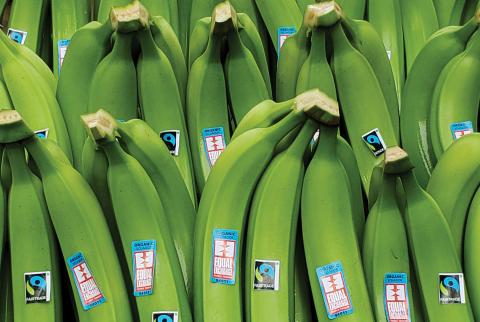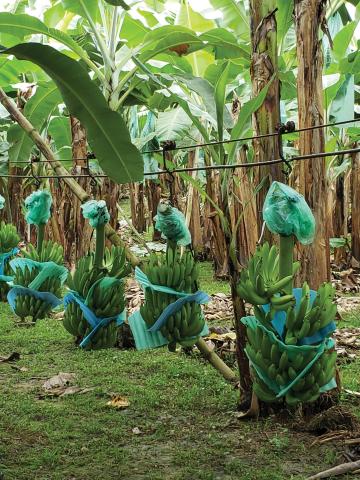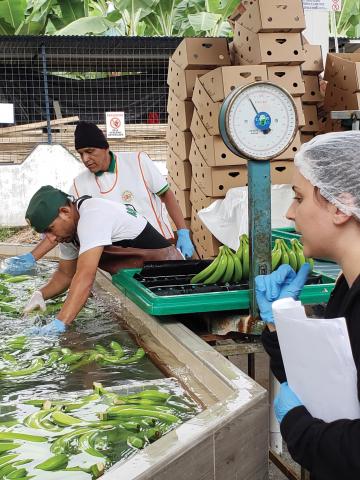Produce Chief Sees the Appeal of Fair Trade Bananas After Trip
In June, I had the pleasure of visiting El Guabo, Ecuador with representatives from Equal Exchange, Four Seasons, our main produce distributor, and other grocery cooperatives with the goal of connecting the whole banana supply chain.
To be honest, when I opened the produce department in Ambler I thought we were charging too much for our bananas. Faced with loads of competition, I thought we were pricing ourselves out of the market. I understood that Fair Trade bananas cost more, but I felt that a better strategy would be to increase prices elsewhere and make up for the lower margin on this staple produce. I cannot tell you how much my opinion on that has changed. It is imperative that we tell the Fair Trade story, make people understand where their food dollars are going, and not try to pass the costs onto something or someone else.
Equal Exchange imports their bananas from Ecuador and Peru. In Ecuador, they work with Asoguabo, a cooperative that does business with over 100 small farmers. These farmers are guaranteed a minimum price on each case of bananas they produce, regardless of market conditions. In addition to the income from their bananas, the cooperative farmers also earn $11 per case from a fair trade premium. The use of this premium is decided democratically by the farmers of the cooperative. In one instance, the proceeds from the premium were used to create a health care facility attached to the Asoguabo office that the farmers and their families can use.
Asoguabo also accepts proposals for community development in areas of need. The cooperative decides which proposals can be fulfilled. For example, they installed a high-grade water filtration system for a group of people that previously only had access to contaminated water. Last year, they built a new roof on an elementary school to provide shelter for an outdoor area that can be used for assemblies and events.
I was excited to see the project firsthand. Once we arrived, we were greeted by all of the children and teachers of the school and enjoyed a short performance from each class. I couldn’t help but think “All I do is order bananas from Four Seasons. Do I really deserve such a gracious round of gratitude from these people, and did I deserve to be there?” I came to understand that through the entire Fair Trade supply chain, from farmers to consumers, there are people affected in positive ways that would not be possible through commodity banana production.
By the Numbers
The average person in the United States eats about 27 pounds of bananas per year, although I know the vegans reading this will laugh at that number. Let’s say that equates to about 75 bananas per year. At Weavers Way, this will set you back about $26.73 per year since we charge 99¢ per pound, assuming you are not a working member receiving your 5% discount. At a leading competitor, it would run you about $13.23, assuming a retail price of 49¢ per pound. So for an additional $13.50, you can get your banana, harvested by hand, washed, packed, inspected for quality, shipped in climate-controlled containers and ripened to your liking delivered to your store, knowing that you are supporting small cooperative farmers who take care of their community and keep their dollars spread among those in need.
So yes, we could charge less for bananas, but you will end up paying more for something else. Therein lies a big problem with the banana industry. When huge corporations slash prices on bananas, it creates massive pressure on the entire grocery industry to match it. Bananas are an economy of scale, but the money made is not being evenly distributed to the supply chain. The margins are slashed all the way down to the farmer and often, people cannot live on that income.
Grocers should not be fooling you into thinking that bananas are this magically cheap and affordable commodity. In his Shuttle column on the topic last fall, General Manager Jon Roesser wrote “This banana dilemma highlights two of our values that often are at odds with one another: our commitment to co-prosperity and protecting the planet vs. our commitment to competitive pricing.”
For my part, I believe that part of our role as a co-op is to educate you about the food we sell. And given what I’ve seen on this trip, our banana price is fair to everyone.
Photos by Eric Fagerstrom








